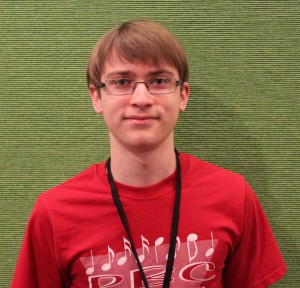By Nico Chiodi – 11th Grade, Homeschool
As I walked down the short flight of stairs that led to the The Saturday Light Brigade (SLB) Radio studio in the lower level of the Children’s Museum of Pittsburgh, I saw students hunched over their computers, working furiously; interaction was hushed and mostly about their projects, as each team worked to meet an impending deadline.
These students are Summer 2015 Heinz Endowments Youth Philanthropy Interns. Part of their internship includes creating a radio documentary for The Green Compass, a series that features stories on issues selected by youth. The program allows interns to experience audio journalism first-hand, as they interview experts, edit the recordings, and write narratives to create an audio story. I was lucky enough to head to the Children’s Museum on Thursday, July 16th to observe the day’s activities.
The program is structured as a five-day intensive with interns learning fundamentals on Monday and completing their pieces by Friday. I joined the sessions in progress: interns had been working hard since Monday and were well into the process of creating their stories. There were three groups of interns, and each group chose an issue that they wanted to cover. On Monday, they pitched their ideas in a meeting and received feedback from each other, mentors at SLB (Sarah Siplak, Larry Berger and Robert Gray), past interns and staff at The Heinz Endowments. After careful deliberation, each group decided on their final topics. They were as follows:
Group 1: The problems that foster children face when applying for financial aid
Group 2: Impact of female police officers on incidents involving excessive force
Group 3: Issues faced by transgender students
On Tuesday and Wednesday, students conducted more research and interviewed experts in their subjects, recording each interview for potential use in their documentary. These documentaries, along with those created by a second group of interns the following week, will be distributed via public radio, Internet, CD and StoryBox(TM), an SLB device that enables on-demand audio playback in public spaces.
A short while after I arrived, one of the mentors, and host of the Saturday Light Brigade Radio program, Larry Berger, called the students of Group 3 into the studio for a conference call to double-check information provided during an interview conducted earlier in the week. The interns had spoken with a teacher and Larry suggested that they also speak with the school’s communications officer as this person would have a more global understanding of the issues at hand. After a few mishaps with the phones, a change of position, and a bit of laughing, the call came through, and the conference started.
The students, crouched over a speaker phone and speaking a little louder than normal so as to be heard, introduced their story and discussed information obtained from the first interview. This new interviewee was friendly throughout the call, and the Group 3 students took notes so that they could use some of the points she made. Because the new interviewee preferred to be off the record, the call was not recorded. Information provided was useful, however, and confirmed the information given by the earlier interview.
Even for full-time journalists, a phone call like this doesn’t happen very often, Larry Berger told me afterward. Though it took a chunk of time when the students could have been furthering their project, I believe this conference had even wider-reaching effects on what interns learned. They were rewarded for choosing a controversial topic by being faced with real-world consequences and additional obstacles, which ultimately taught them a valuable lesson: There can be obstacles to getting accurate information, but they can be worked through. Kailyn, a member of Group 3, said, “I personally know that I’ve learned a lot.”
While only one aspect of The Heinz Endowments Youth Philanthropy Internship Program, production of these documentaries provides unique opportunities for learning, self-expression and aspiring journalism students. Working through challenges such as the cross-checking interview — not to mention the challenge of completing a story under a tight deadline — gives the reporters one more tool in their professional toolboxes that will have applications beyond the week at hand. After a workshop like this, interns can bring more confidence and real-world experience to their schools and jobs, both very necessary for people of our generation.
 Nico Chiodi is going into 11th grade. He lives in Thornburg and is home schooled. He has been in Pittsburgh Youth Media for 2 years and has published stories in Belt Mag’s Pittsburgh Anthology. Nico can be seen playing banjo with his father and brother all around the city.
Nico Chiodi is going into 11th grade. He lives in Thornburg and is home schooled. He has been in Pittsburgh Youth Media for 2 years and has published stories in Belt Mag’s Pittsburgh Anthology. Nico can be seen playing banjo with his father and brother all around the city.
Leave a Comment